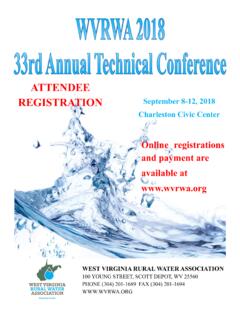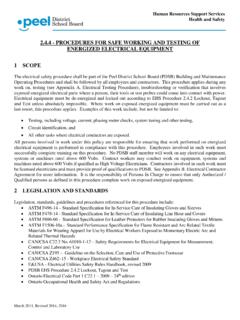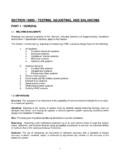Transcription of WATER DISTRIBUTION SYSTEM OPERATOR MANUAL
1 WATER DISTRIBUTION SYSTEM OPERATOR MANUAL 2016 -1 - WATER DISTRIBUTION SYSTEM OPERATOR MANUAL Overview/Preface This MANUAL has been developed to provide you with some basic information to assist you in operating your WATER SYSTEM and serving safe drinking WATER . The MANUAL also gives you background information on how WATER systems work and the regulations applied to public WATER systems in West Virginia. With the great diversity and dynamics present in the WATER treatment industry, it is important for operators to be resourceful at least know enough to ask the right questions to the right people. Your WATER supply is critical to the operation of your facility and an uninterrupted, safe supply of WATER is necessary for your daily operations. Additionally, state and federal regulations require you to provide a safe and adequate supply of WATER .
2 Knowing about your WATER SYSTEM , operating it properly, and performing preventative maintenance can help avoid unsafe, costly, and inconvenient problems with your WATER SYSTEM . Information contained within this MANUAL should give you a basic understanding of any WATER SYSTEM you may work with and enable you to apply a systematic troubleshooting process to solve or correct operational problems of a small ground WATER SYSTEM with disinfection using hypochlorination. At no time should the OPERATOR undertake troubleshooting activities for which they are not trained for or involve unsafe practices. The troubleshooting process presented in this MANUAL begins with the simplest, and often the easiest to correct, and continues to the more complex without endangering the OPERATOR or the users of the WATER SYSTEM .
3 The troubleshooting steps allow the OPERATOR to assess an operational problem to the point that it can either be easily corrected or requires a technical specialist, electrician, well specialist, etc. The MANUAL also encourages the user to contact their state drinking WATER office (Office of Environmental Health Services) for information, technical assistance and advice when responding to a WATER SYSTEM problem. Disclaimer All reasonable precautions have been taken in the preparation of this document, including both technical and non-technical proofing. The West Virginia Department of Health and Human Resources and West Virginia Rural WATER Association and all staff assume no responsibility for any errors or omissions. Should the summarized information in this document be inconsistent with a governing rule or statute, the language of the rule or statute shall prevail.
4 Reference herein to any specific commercial products, process, or service by trade name, trademark, manufacturer, or otherwise, does not necessarily constitute or imply its endorsement, recommendation, or favoring by the West Virginia Department of Health and Human Resources and West Virginia Rural WATER Association. -2 -TABLE OF CONTENTS Page I. Content A. INTRODUCTION INTO BEING A CERTIFIED OPERATOR 5 B. WATER DISTRIBUTION SYSTEM CERTIFICATION 6 C. INTRODUCTION TO D. DRINKING WATER REGULATIONS 11 E. INTRODUCTION TO PUBLIC WATER SUPPLIES 6 F. OPERATOR CERTIFICATION PROGRAM 8 G. GUIDANCE FOR CERTIFIED WATER OPERATORS 11 H.
5 PUBLIC WATER SYSTEM REGULATIONS 13 I. PERMITS 14 J. MONITORING AND REPORTING 15 K. PUBLIC NOTIFICATION 21 L. BOIL WATER NOTICE 25 M. THE WATER CYCLE 26 N. GROUNDWATER 27 O. WELL TERMS & COMPONENTS 28 1. TROUBLESHOOTING WELL PROBLEMS 31 P. SUBMERSIBLE PUMPS 33 1. TROUBLESHOOTING WELL PUMP PROBLEMS 37 Q.
6 HYDROPNEUMATIC TANKS 40 R. BASIC ELECTRICITY 44 S. IRON AND MANGANESE CONTROL 47 T. DISINFECTION (HYPOCHLORINATION) 51 U. FULL-TIME CHLORINATION 54 V. CHLORINE MONITORING 55 W. CONTACT TIME 56 X. HYPOCHLORINATION FEED SYSTEMS 57 1. TROUBLESHOOTING HYPOCHLORINATION PROBLEMS 58 Y. CHLORINE SAFETY 59 Z. DISTRIBUTION SYSTEM 60 AA. CROSS-CONNECTION & BACKFLOW PREVENTION 69 BB. BASIC SAMPLING PROCEDURES 72 CC. SAMPLING & MONITORING 75 1.
7 TROUBLESHOOTING SAMPLING & MONITORING 77 2. A BASIC SAMPLING SITE PLAN 78 3. DEVELOPING A SAMPLING SITE PLAN 81 4. BACTERIOLOGICAL SAMPLING INFORMATION 82 a. Bacteriological Sampling Procedure 83 5. TOTAL NITRATES SAMPLING INFORMATION 85 a. Total Nitrates Sampling Procedure 88 6. CHLORINE TEST KIT CN-66 COLOR WHEEL INFORMATION 89 a. Procedure for Testing Free Chlorine Residual (using DPD Method) 90 b. Procedure for Testing Total Chlorine Residual (using DPD Method) 91 -3 -7. POCKET COLORIMETER 92 a.
8 Free Chlorine (0 to mg/L Cl2) 94 b. Total Chlorine, Low Range (0 to mg/L Cl2) 95 8. USING Spec SECONDARY STANDARDS 96 DD. SAFETY 97 EE. MANAGEMENT COMPONENTS 102 1. GENERAL RECORD KEEPING 104 a. Maintaining Records & Reports 107 2. COLIFORM SAMPLING PLANS 108 3. MAINTENANCE PROGRAM 109 4. SAFETY PROGRAMS 112 5. COMPLIANCE RECORD KEEPING 113 FF.
9 BASIC MATH 114 II. Appendix A. GLOSSARY 117 B. LIST OF ACRONYMS 127 C. CONTACTS 128 D. FORMS 131 E. REGULATIONS (64 CSR3 and 64 CSR4) Individually Numbered -4 -INTRODUCTION INTO BEING A CERTIFIED OPERATOR Why should I become a certified OPERATOR ?
10 Drinking WATER SYSTEM operators are front-line environmental professionals who ensure the quality of West Virginia's WATER resources and protect the public's health. Every public WATER SYSTEM (PWS) in West Virginia must employ a certified OPERATOR . Working in the WATER industry can be extremely rewarding as you will be providing a critical service to your community. It just might be one of the most important positions in the world since no one can live without WATER . It takes knowledgeable, conscientious people to deliver clean, potable WATER . Certification Process Certification is obtained by meeting minimum education and experience requirements, submitting the appropriate forms and by passing the certification examination with at least a 70%. Regulations pertaining to the certification of drinking WATER operators are located in 64 CSR04.











